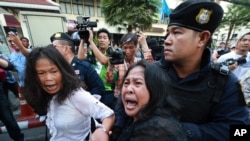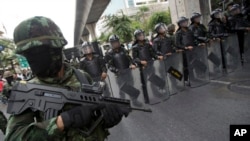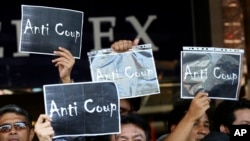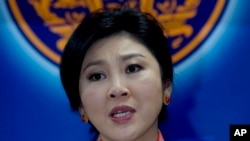BANGKOK —
The U.S. military has canceled training and readiness exercises with Thailand, as well as a visit to the Asian nation by U.S. Pacific Fleet commander originally scheduled for June, the Pentagon said Saturday.
"As we have made clear, it is important that the Royal Thai Armed Forces end this coup and restore to the people of Thailand both the principles and the process of democratic rule, including a clear path forward to elections," Pentagon Press Secretary Rear Adm. John Kirby said in a statement.
Thailand’s army chief, who has named himself prime minister, has now also assumed all legislative power. His junta on Saturday dissolved the kingdom’s partly-elected Senate. Meanwhile, several hundred citizens took to the streets Saturday to voice their opposition to Thursday’s coup, an act of civil disobedience banned by the military’s governing council.
In a loosely organized demonstration, hundreds circled the capital’s Victory Monument, chanting “soldiers get out” and “no coup.”
Army chief Prayuth Chan-ocha, who led the coup Thursday, declared himself acting prime minister Friday and dissolved the Senate on Saturday, has assumed all lawmaking powers. He said the moves are necessary to restore public order and push through political reforms.
Many of those voicing opposition to Prayuth's actions claim no alliance with Thailand’s color-coded protesters, who have polarized Thai politics for years. Soldiers forced those protesters from their camps in the hours after the coup.
The new anti-coup demonstrators managed to foil soldiers who blocked them from marching to the monument Saturday afternoon. When troops cut off a major avenue on the march route, there were brief scuffles. But protesters hopped on the Bangkok “Skytrain” to circumvent the roadblock.
Among those on the streets were Poongsa Poongchan, who said he spontaneously decided to join the march.
“I just came to the bank and I found many people. After that, I joined,” he said.
Independent researcher Art Werapong, at the rally at the monument, said he decided to participate even if it meant defying the military junta’s decree prohibiting public gatherings of more than five people.
“I’m scared for my life coming here. I’ve got a family, I’m educated. I can have a normal, comfortable life," he said. "But I’m scared for the people in the younger generation who may not live the same way.”
Among those observing the Victory Monument rally was Sean Boonpracong, a former national security adviser in the government of former prime minister Yingluck Shinawatra. Yingluck, whose Peau Thai Party won a landslide victory in the last nation election in 2011, is being detained by the military. A spokesman said the military intends to keep her in custody for “no more than a week.”
Sean told VOA he appreciated U.S. diplomats condemning Prayuth’s order to impose media censorship.
“Vicious rumors could go around and it could get a lot of people talking," he said. "It’s best that they allow more freedom of information to flow, just like (U.S.) Ambassador Kristie Kenney said, so people don’t have to go underground and be in the dark.”
He termed the anti-coup rally Thailand’s “first Internet anti-coup protest,” as it was not organized by the pro-government Red Shirt movement, of which he was a leader.
The military on Saturday told 35 more people to report to army facilities, going beyond the previous category of political figures and protest leaders. On the list were several intellectuals.
Chulalongkorn University political science professor Panitan Wattanayagorn said the summons to writers and academics shows the military is engaging in a more systematic crackdown than it did following the last coup in 2006.
“The military may ask for cooperation from them to do things, not to do things and maybe monitor their behavior," said Panitan. "Since they have full power under the martial law, if they don't comply then maybe harder measures could be applied to them.”
With the senate newly dissolved, former lawmaker Dr. Jetn Sirathranont -- who had called on then-Prime Minister Yingluck to resign -- said the general's takeover came as no surprise. He gave it tacit endorsement.
“If you have the Senate, we will have the many senators who don't agree with the coup detat.Someone may speak in the Senate against Gen. Prayuth," said Jetn. "That's not good. If they still prolong the Senate, it will make the job of Gen. Prayuth more difficult."
The United States has suspended $3.5 million in military aid to Thailand, and says it is reviewing whether to cut another $7 million in assistance.
The U.S. State Department also warned U.S. citizens against non-essential travel to the country.
The Thai military already had banned Yingluck and more than 150 other political figures from leaving Thailand without permission.
It is not clear if the other politicians in custody are being held in the same location. The country's caretaker prime minister, Niwattumrong Boosongpaisan, was among those summoned by military authorities. Until the bloodless coup, he had been in charge of the kingdom on an acting basis after a court ordered Yingluck to step down earlier this month on charges of nepotism.
Thailand has been wracked by six months of political disputes and sometimes violent demonstrations. Crisis talks between rival political parties broke down early this past week. Nearly 30 people have been killed during anti-government protests.
Thailand's army has staged 12 coups in the last 80 years.
VOA's Ron Corben in Bangkok contributed to this report, and Jeff Seldin also contributed.
"As we have made clear, it is important that the Royal Thai Armed Forces end this coup and restore to the people of Thailand both the principles and the process of democratic rule, including a clear path forward to elections," Pentagon Press Secretary Rear Adm. John Kirby said in a statement.
Thailand’s army chief, who has named himself prime minister, has now also assumed all legislative power. His junta on Saturday dissolved the kingdom’s partly-elected Senate. Meanwhile, several hundred citizens took to the streets Saturday to voice their opposition to Thursday’s coup, an act of civil disobedience banned by the military’s governing council.
In a loosely organized demonstration, hundreds circled the capital’s Victory Monument, chanting “soldiers get out” and “no coup.”
Army chief Prayuth Chan-ocha, who led the coup Thursday, declared himself acting prime minister Friday and dissolved the Senate on Saturday, has assumed all lawmaking powers. He said the moves are necessary to restore public order and push through political reforms.
Many of those voicing opposition to Prayuth's actions claim no alliance with Thailand’s color-coded protesters, who have polarized Thai politics for years. Soldiers forced those protesters from their camps in the hours after the coup.
The new anti-coup demonstrators managed to foil soldiers who blocked them from marching to the monument Saturday afternoon. When troops cut off a major avenue on the march route, there were brief scuffles. But protesters hopped on the Bangkok “Skytrain” to circumvent the roadblock.
Among those on the streets were Poongsa Poongchan, who said he spontaneously decided to join the march.
“I just came to the bank and I found many people. After that, I joined,” he said.
Independent researcher Art Werapong, at the rally at the monument, said he decided to participate even if it meant defying the military junta’s decree prohibiting public gatherings of more than five people.
“I’m scared for my life coming here. I’ve got a family, I’m educated. I can have a normal, comfortable life," he said. "But I’m scared for the people in the younger generation who may not live the same way.”
Among those observing the Victory Monument rally was Sean Boonpracong, a former national security adviser in the government of former prime minister Yingluck Shinawatra. Yingluck, whose Peau Thai Party won a landslide victory in the last nation election in 2011, is being detained by the military. A spokesman said the military intends to keep her in custody for “no more than a week.”
Sean told VOA he appreciated U.S. diplomats condemning Prayuth’s order to impose media censorship.
“Vicious rumors could go around and it could get a lot of people talking," he said. "It’s best that they allow more freedom of information to flow, just like (U.S.) Ambassador Kristie Kenney said, so people don’t have to go underground and be in the dark.”
He termed the anti-coup rally Thailand’s “first Internet anti-coup protest,” as it was not organized by the pro-government Red Shirt movement, of which he was a leader.
The military on Saturday told 35 more people to report to army facilities, going beyond the previous category of political figures and protest leaders. On the list were several intellectuals.
Chulalongkorn University political science professor Panitan Wattanayagorn said the summons to writers and academics shows the military is engaging in a more systematic crackdown than it did following the last coup in 2006.
“The military may ask for cooperation from them to do things, not to do things and maybe monitor their behavior," said Panitan. "Since they have full power under the martial law, if they don't comply then maybe harder measures could be applied to them.”
With the senate newly dissolved, former lawmaker Dr. Jetn Sirathranont -- who had called on then-Prime Minister Yingluck to resign -- said the general's takeover came as no surprise. He gave it tacit endorsement.
“If you have the Senate, we will have the many senators who don't agree with the coup detat.Someone may speak in the Senate against Gen. Prayuth," said Jetn. "That's not good. If they still prolong the Senate, it will make the job of Gen. Prayuth more difficult."
The United States has suspended $3.5 million in military aid to Thailand, and says it is reviewing whether to cut another $7 million in assistance.
The U.S. State Department also warned U.S. citizens against non-essential travel to the country.
The Thai military already had banned Yingluck and more than 150 other political figures from leaving Thailand without permission.
It is not clear if the other politicians in custody are being held in the same location. The country's caretaker prime minister, Niwattumrong Boosongpaisan, was among those summoned by military authorities. Until the bloodless coup, he had been in charge of the kingdom on an acting basis after a court ordered Yingluck to step down earlier this month on charges of nepotism.
Thailand has been wracked by six months of political disputes and sometimes violent demonstrations. Crisis talks between rival political parties broke down early this past week. Nearly 30 people have been killed during anti-government protests.
Thailand's army has staged 12 coups in the last 80 years.
VOA's Ron Corben in Bangkok contributed to this report, and Jeff Seldin also contributed.








